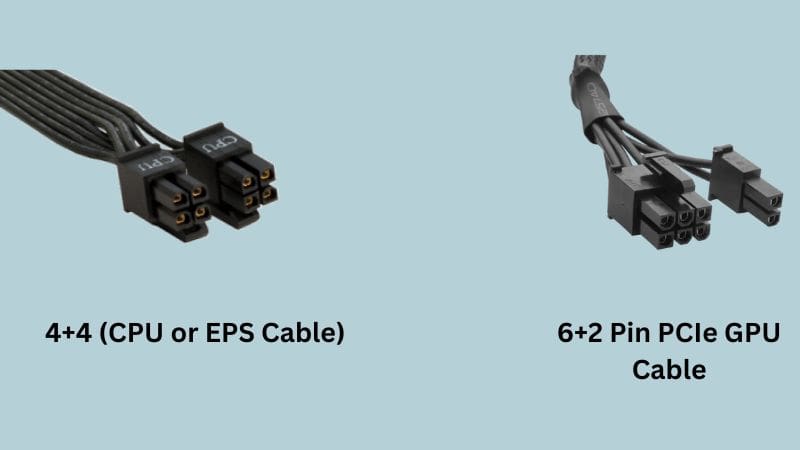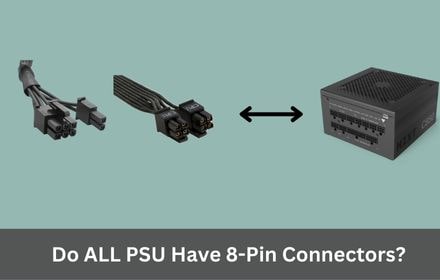Before buying a new Power Supply, many beginners have doubts and ask whether all PSUs have an 8-pin connector because their system will require the 8-pin cable.
Most modern PSUs come with 8-Pin connectors for the CPU & GPU, but some unbranded or low-end PSUs don’t come with any of these cables.
In the later part of this article, you will know how to check whether any PSU has an 8-pin connector or not.
But, before that, you need to acquire some basic info about different types of 8-pin connectors on Power Supply.
Types Of 8-Pin Connectors on Power Supply
There are two types of 8-pin connectors on Power Supply, and both these connectors have different uses.

One 8-pin connector is called an EPS connector, and the primary use of this cable is to supply the necessary power for our CPU.
The other 8-pin connector is known as the PCIe connector, and this cable is used to supply the necessary power for our GPU.
When building a PC, we need to connect the 8-pin EPS connector on the motherboard and the 8-pin PCIe connector on GPU’s PCIe port.
You can easily identify both these cables by checking the labeling on the cable. If there is no labeling on the cables, then you can also identify the cables by splitting the cables.
The 8-pin EPS cable will split into 4+4 pins, whereas the 8-pin PCIe cable will split into 6+2 pins.
If you are still not able to identify both cables, then you can read this article where I mention the differences between CPU vs. GPU cables.
Check Whether You Need An 8-Pin Cable
Some motherboards do not require the 8-pin EPS cable; instead, only a 4-pin cable will require due to the CPU’s low power requirement. Check the motherboard to get this info.
On the other hand, some mobos require both 8-pin and 4-pin cables due to the CPU’s high power requirement.
Read this article to know- whether you need both 8-pin and 4-pin cables.
Likewise, you may not require the 8-pin PCIe cable; instead, your GPU will only require a 6-pin cable because of the GPU’s low power requirement, or you may not require the 8-pin PCIe cable if you build a PC with integrated graphics.
However, you need multiple PCIe cables if you are building a PC with a high-end GPU with a high power consumption. Read this article to identify whether your GPU needs one, two, or more PCIe cables.
How To Check Whether Your PSU Has an 8-Pin Connector?
If your motherboard has the 8-pin connector requirement for the CPU and if your GPU requires an 8-pin PCIe connector, then you have to buy a PSU with both these 8-pin connectors.
The easiest way to check whether any Power Supply has an 8-pin or not is by searching about that PSU online.
Here I will show you how I search Thermaltake Through a power series PSU, whether it has the 8-pin connector or not-
Firstly, I searched for this PSU model on Amazon and went to the buying page of the PSU.
Next, on the left side, you will get several images of the PSU; see all those images one by one.
You will get a page that clearly mentions what cables will come with this PSU.

In the image, the red box shows that this PSU will come with one 4+4-pin or one 8-pin EPS cable.
While the blue box is showing, this PSU will come with two 6+2 pin or 8-pin PCIe cables.
Let’s take another example-
I searched about the CoolMax I power supply on Amazon, and this PSU does not have images.
In this case, I read the About this item section, where it is clearly mentioned this PSU does not have any of these 8-pin cables.

You can clearly see in the image that the PSU does not have the 8-pin PCIe cable and 8-pin EPS cable; instead, it only has one 4-pin P4 connector.
Does My PSU Have A 8-Pin Connector?
Whether your Power Supply has an 8-pin connector or not can be determined by checking its specifications or by checking it physically.
If you don’t know your PSU model, then you have to open the PC case to check whether the psu has both the 8-pin connectors.
Use Adapters If Your PSU Doesn’t Have an 8-Pin For GPU
If you are thinking of installing a GPU that has an 8-pin requirement, and you realize that your PSU doesnt have any 8-pin for GPU, then you can use different types of adapters available in the market.
Some of those adapters include PCIe 6-pin to 8-pin, SATA to 8-pin, and Molex to 8-pin.
Which adapter you should use is a complicated discussion because different adapters supply different watts of power.
Make sure the adapter you will use can supply the necessary power for the GPUs; if the adapter isn’t able to supply the necessary power, then the GPU will not run.
If you are in a situation like this, then understand which adapter is perfect for your GPU by reading this article: What to Do If PSU Doesn’t have enough Pins?
Wrapping Up
The gist of the entire discussion is that all PSUs do not have the 8-pin EPS and PCIe connectors; in some cases, you may not require these connectors.
But, if your motherboard and GPU require both these 8-pin connectors, then you need to check the specifications of the PSU whether it has both the 8-pin cables or not.
You can also see images of the PSU on Amazon to figure out whether it has 8-pin connectors or not.
I hope this article may be helpful for you, and if you have any other questions, then ask me in the comment box below.
